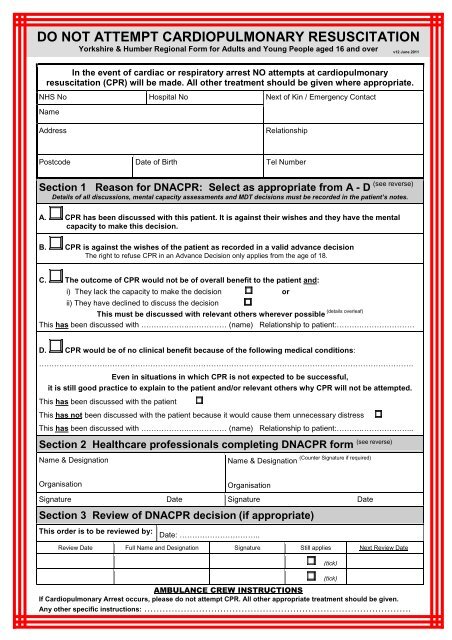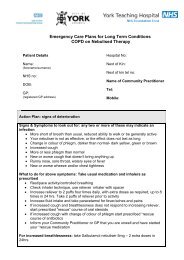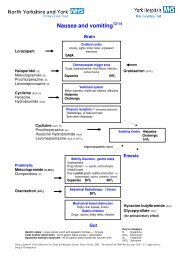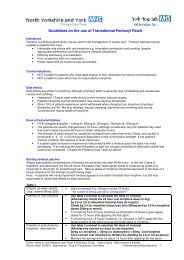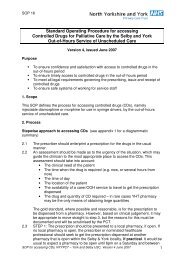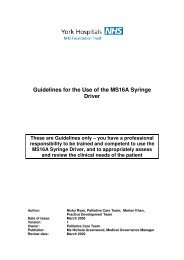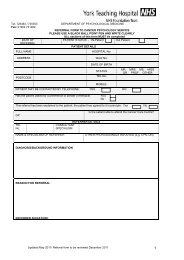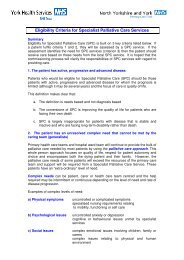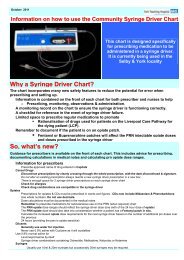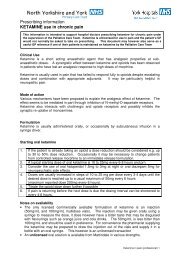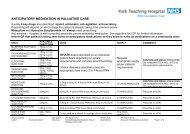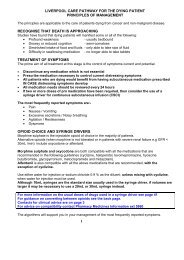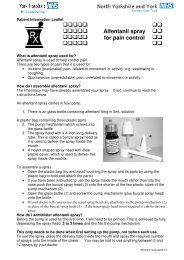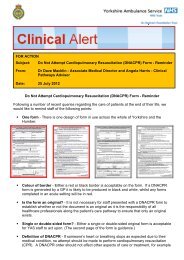DNACPR form - NHS Sheffield
DNACPR form - NHS Sheffield
DNACPR form - NHS Sheffield
You also want an ePaper? Increase the reach of your titles
YUMPU automatically turns print PDFs into web optimized ePapers that Google loves.
DO NOT ATTEMPT CARDIOPULMONARY RESUSCITATION<br />
Yorkshire & Humber Regional Form for Adults and Young People aged 16 and over<br />
v12 June 2011<br />
In the event of cardiac or respiratory arrest NO attempts at cardiopulmonary<br />
resuscitation (CPR) will be made. All other treatment should be given where appropriate.<br />
<strong>NHS</strong> No<br />
Name<br />
Hospital No<br />
Next of Kin / Emergency Contact<br />
Address<br />
Relationship<br />
Postcode Date of Birth Tel Number<br />
Section 1 Reason for <strong>DNACPR</strong>: Select as appropriate from A - D<br />
(see reverse)<br />
Details of all discussions, mental capacity assessments and MDT decisions must be recorded in the patient’s notes.<br />
A. CPR has been discussed with this patient. It is against their wishes and they have the mental<br />
capacity to make this decision.<br />
B. CPR is against the wishes of the patient as recorded in a valid advance decision<br />
The right to refuse CPR in an Advance Decision only applies from the age of 18.<br />
C. The outcome of CPR would not be of overall benefit to the patient and:<br />
i) They lack the capacity to make the decision or<br />
ii) They have declined to discuss the decision<br />
(details overleaf)<br />
This must be discussed with relevant others wherever possible<br />
This has been discussed with ……………….…………… (name) Relationship to patient:……….…………………<br />
D. CPR would be of no clinical benefit because of the following medical conditions:<br />
………………………………………………………………………………………………………………………………….<br />
Even in situations in which CPR is not expected to be successful,<br />
it is still good practice to explain to the patient and/or relevant others why CPR will not be attempted.<br />
This has been discussed with the patient<br />
This has not been discussed with the patient because it would cause them unnecessary distress<br />
This has been discussed with ……………….…………… (name) Relationship to patient:……….………………...<br />
Section 2 Healthcare professionals completing <strong>DNACPR</strong> <strong>form</strong><br />
Name & Designation<br />
Name & Designation<br />
(Counter Signature if required)<br />
(see reverse)<br />
Organisation<br />
Organisation<br />
Signature Date Signature Date<br />
Section 3 Review of <strong>DNACPR</strong> decision (if appropriate)<br />
This order is to be reviewed by:<br />
Date: …………………………..<br />
Review Date Full Name and Designation Signature Still applies Next Review Date<br />
AMBULANCE CREW INSTRUCTIONS<br />
If Cardiopulmonary Arrest occurs, please do not attempt CPR. All other appropriate treatment should be given.<br />
Any other specific instructions: …………………………………………………………………………….<br />
(tick)<br />
(tick)
These guidelines are based on an agreement within the Yorkshire and Humber region.<br />
For more details refer to your local policy relating to <strong>DNACPR</strong>.<br />
This is not a legally binding document; the decision may change according to clinical circumstances<br />
Section 1 Guidance (Please write legibly and with black ink)<br />
Option A<br />
Record details in the patient’s notes, including the assessment of the patient’s mental capacity to make this decision.<br />
Option B<br />
The Mental Capacity Act (2005) confirms that an advance decision refusing CPR will be valid and therefore legally binding<br />
on the healthcare team, if:<br />
1. The decision is in writing, signed, witnessed and the patient is aged 18 or over;<br />
2. It includes a statement that the advance decision is to apply even if the patient’s life is at risk;<br />
3. The advance decision has not been withdrawn;<br />
4. The patient has not, since the advance decision was made, appointed a welfare attorney to<br />
make decisions about CPR on their behalf;<br />
5. The patient has not done anything clearly inconsistent with its terms; and<br />
6. The circumstances that have arisen match those envisaged in the advance decision.<br />
16 and 17-year-olds: Whilst 16 and 17-year-olds with capacity are treated as adults for the purposes of consent, parental responsibility<br />
will continue until they reach age 18. Legal advice should be sought in the event of disagreements on this issue between a young person<br />
of 16 or 17 and those holding parental responsibility<br />
Option C<br />
1. The term “overall benefit” is used in the context defined by GMC Guidance 2010 (Treatment & Care towards the<br />
End of Life; pg. 40-46; paragraphs 6, 13) and takes into account “best interests” as defined by the Mental<br />
Capacity Act, 2005.<br />
2. This situation must be discussed with relevant others where possible. Record details of your discussion in the<br />
patient’s notes.<br />
3. The term “relevant others” is used to describe a patient’s relatives, carers, representatives, people with lasting<br />
power of attorney, independent mental capacity advocates (IMCAs), advocates, and court appointed deputies<br />
(refer to Mental Capacity Act) http://www.dh.gov.uk<br />
Option D<br />
Record underlying condition/s eg poor Left Ventricular function, end stage obstructive airway disease,<br />
disseminated malignancy with poor per<strong>form</strong>ance status.<br />
Section 2 Authorisation<br />
Responsibility for making the <strong>DNACPR</strong> decision lies with a senior doctor (e.g. Consultant, GP) who has responsibility for<br />
the patient. In some localities, other healthcare professionals who have undertaken the necessary training may make the<br />
<strong>DNACPR</strong> decision.<br />
If junior medical staff or other authorised professionals have been instructed to sign the <strong>form</strong> by a senior clinician, the <strong>form</strong><br />
should be countersigned by the senior doctor, as soon as possible or as per local policy.<br />
Section 3<br />
Review – In accordance with your local Policy.<br />
It is considered good practice to review <strong>DNACPR</strong> status in the following circumstances:<br />
• At the consultant ward round, MDT or Gold Standards Framework meeting;<br />
• On transfer of medical responsibility (eg hospital to community or vice versa); or<br />
• Whenever there are significant changes in a patient’s condition.<br />
When the <strong>form</strong> is no longer valid, either because the patient is for CPR or because a new <strong>form</strong> has been completed, it<br />
must be marked as cancelled by making two thick, dark, diagonal lines across the <strong>form</strong>, writing CANCELLED in large<br />
capitals and adding your signature and date. It should then be filed in the patient’s notes.<br />
COMMUNICATING <strong>DNACPR</strong> DECISIONS<br />
It is the responsibility of the healthcare professional completing the <strong>form</strong> to ensure that the <strong>DNACPR</strong> status is<br />
communicated to all who need to know.<br />
For patients being transferred between different care settings, it is essential that all professionals including Out of<br />
Hours (OOH) and Ambulance (e.g. Yorkshire Ambulance Service) are made aware of this <strong>DNACPR</strong> order<br />
1. Send the original <strong>form</strong> with the patient.<br />
2. A photocopy should only be retained in the patient’s notes for audit, marked with the words ‘COPY’ in large<br />
capitals, signed and dated.<br />
3. In circumstances where patients are being transferred to community: the <strong>DNACPR</strong> status should be communicated to<br />
patient (if appropriate) and ‘relevant others’. They may prefer the <strong>form</strong> to be placed in a clearly marked envelope.<br />
4. For discharges to community settings: communicate to the GP, Out of Hours service, and<br />
any other relevant services as appropriate e.g. Hospice.<br />
v12 June 2011<br />
Regional Review Date: June 2013<br />
Regional Lead Contact: Palliative Medicine Consultant<br />
Airedale <strong>NHS</strong> Foundation Trust, West Yorkshire


